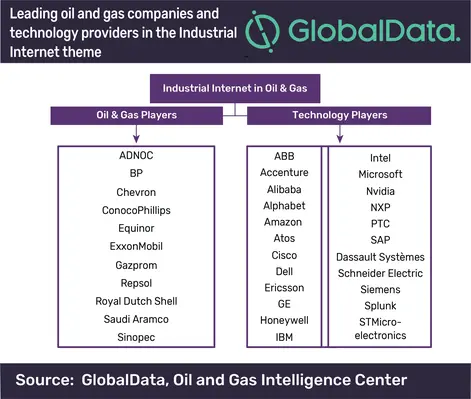The upstream sector is witnessing considerably more Industrial Internet implementation compared to other oil and gas sectors, according to GlobalData, a data and analytics company
This is driven by the need to reduce operational risks and maximise returns from their assets through digitalisation, according to the company’s thematic report: ‘Industrial Internet in Oil & Gas’.
The report reveals that the adoption of the Industrial Internet would allow companies to reduce risks and optimise performance by digitising oilfield operations and creating digital twins.
The data company noted that Industrial Internet has the potential to transform traditional processes and workflows and boost the technological capabilities of oil and gas firms.
This could help the organisation achieve two primary objectives: firstly, companies would be able to overcome operational challenges while venturing into new frontiers in search of hydrocarbon resources. Secondly, Industrial Internet adoption will improve productivity and efficiency, thereby strengthening market competitiveness in a challenging environment.
Ravindra Puranik, oil and gas analyst at GlobalData, said, “In general, adoption of the Industrial Internet would make organisations more dynamic and adaptable to external factors. This concept is expected to play a central role in simulation and modelling of projects against different market scenarios, optimising inventory levels, demand forecasting, decision support, and logistics optimisation, and setting up long-term objectives for an organisation.”
Adoption of digital technologies has surged of late, largely as a reaction to the crash in crude oil prices. However, companies have been quite methodical in their approach to enable this transformation and ensuring maximum possible value can be derived through Industrial Internet implementations.

“This is particularly evident in the case of digital twins, wherein companies have chosen fields that have recently entered into production or are on the verge, to allow for the integration of advanced sensors and connectivity with oilfield infrastructure for remote monitoring and analysis. To highlight one such instance, BP created a digital twin at the Claire Ridge project in the North Sea, which started producing oil in 2018. WorleyParsons assisted the company in the creation of a digital replica of the field,” he added.
GlobalData’s thematic research identifies oil and gas companies, such as BP, Shell, Chevron, ExxonMobil, ConocoPhillips, Gazprom, Repsol, Equinor, Saudi Aramco, Sinopec, and ADNOC as the major players in the adoption of the Industrial Internet theme in the oil and gas industry.
These companies are adeptly assisted by technology providers, such as Microsoft, IBM, Amazon, PTC, Cisco and Intel, which are gradually assuming leadership in delivering Industrial Internet solutions to the oil and gas industry.







